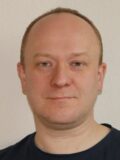Matthias Schäfer
Matthias Schäfer
19+
Weitere Informationen
Publikationen
2020
- , , , , :
Experimental Evaluation of the N-Ray Ground Interference Model
12th IEEE Vehicular Networking Conference (VNC 2020) (Virtual Conference, 2020-12-16 - 2020-12-18)
In: Proceedings of the 12th IEEE Vehicular Networking Conference (VNC 2020), Virtual Conference: 2020
DOI: 10.1109/VNC51378.2020.9318362
BibTeX: Download
